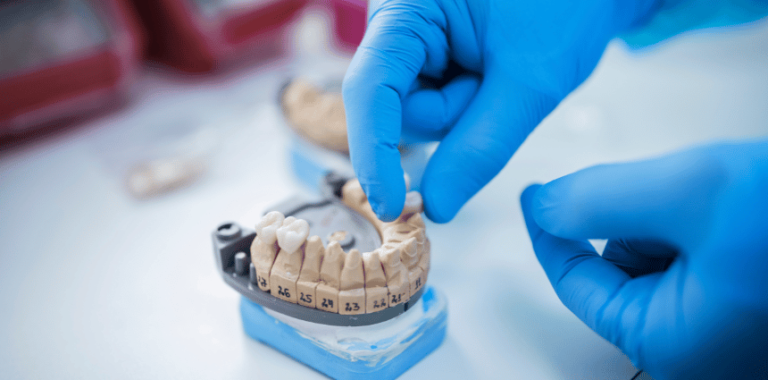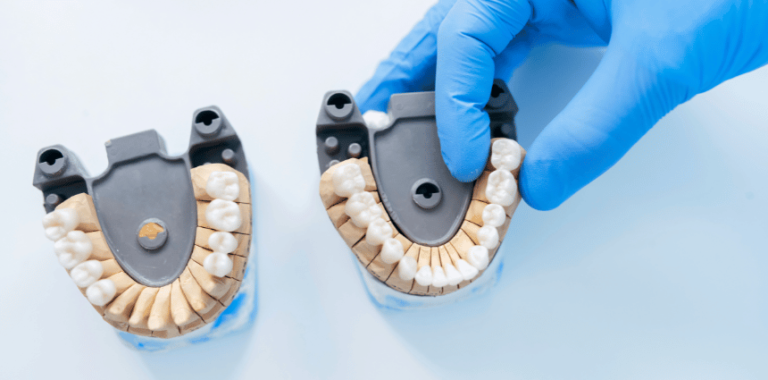Tooth Replacement
- Home
- Tooth Replacement
Losing a tooth can be a challenging experience, but it’s essential to know that you have options for tooth replacement. At Church Street Dental in Chicopee, MA, we offer various tooth replacement options to help our patients regain their smile and oral function. Whether you need to replace one tooth or multiple teeth, our dental professionals will work with you to find the best solution for your unique needs and goals.
Types of Tooth Replacement Options
There are several tooth replacement options to choose from, each with its own benefits and drawbacks. Some of the most common options include:
- Dental Implants
- Porcelain Bridges
- Full Or Partial Dentures
The Right Tooth Replacement Option for You
The right tooth replacement option for you will depend on several factors, including your budget, missing teeth number, and overall oral health. Our team at Church Street Dental will work with you to determine the best tooth replacement option for your unique needs and goals.


FULL OR PARTIAL DENTURES
Dentures have been around for centuries and have come a long way in terms of comfort, fit, and appearance. They have been used to replace missing teeth, restore oral function, and enhance the smile. At Church Street Dental in Chicopee, MA, we offer our patients a full range of denture services. Our goal is to help you achieve a functional and aesthetically pleasing smile, regardless of the extent of your tooth loss.
TYPES OF DENTURES
There are two main types of dentures: full dentures and partial dentures. Full dentures are used to replace an entire arch of missing teeth, while partial dentures are used to replace only a few missing teeth. Both types of dentures can be designed to match the natural appearance of your teeth to blend in seamlessly with your smile.
FULL DENTURES
Full dentures are designed to replace all the teeth in either the upper or lower jaw. They are custom-made to fit securely and comfortably over the gum line, using a combination of natural suction and dental adhesives. Our dental team at Church Street Dental will work closely with you to ensure that your full dentures fit comfortably and look natural and aesthetically pleasing.
PARTIAL DENTURES
Partial dentures are designed to replace only a few missing teeth rather than a complete arch. They are typically made of acrylic or a combination of acrylic and metal and are designed to fit securely over the remaining natural teeth. Partial dentures can be removable or fixed in place using dental implants or dental bridges. Our dental team at Church Street Dental will help you choose the best type of partial denture for your needs and goals.
MAINTAINING YOUR DENTURES
Like your natural teeth, dentures require regular maintenance and care. This includes cleaning them daily, storing them properly when they are not used, and having them professionally cleaned and inspected at least once a year. At Church Street Dental, we offer repair and relining services to help you keep your dentures in top condition for as long as possible.
IMPLANTS
Losing a tooth can be a traumatic experience, not just for the appearance of your smile but also for the impact it can have on your oral health and quality of life. Dental implants are an excellent option for restoring missing teeth, providing a long-lasting, stable solution that looks natural and feels that way. If you’re looking for a professional and experienced dentist to help you with your dental implant needs in Chicopee, MA, look no further than Church Street Dental.
What are Dental Implants?
A dental implant is a small post, usually made of titanium, surgically placed into the jawbone to replace the missing tooth root. Over time, the implant fuses with the surrounding bone, creating a strong and stable foundation for a dental crown, bridge, or denture. Implants look, feel, and function like natural teeth, allowing you to eat, speak and smile confidently.
Benefits of Dental Implants
There are several benefits to choosing dental implants to replace missing teeth, including:
- Natural appearance: Dental implants are designed to match the color and shape of your existing teeth, providing a natural-looking and seamless restoration.
- Improved oral health: Dental implants do not require a reduction of surrounding teeth, as with a bridge. This helps to preserve the natural structure of your mouth, leading to improved oral health.
- Stable and secure: Implants are anchored directly into the jawbone, providing a stable and secure restoration that won’t slip or shift like dentures.
- Durable: With proper care and maintenance, dental implants can last a lifetime, making them a cost-effective long-term solution.
- Enhanced self-esteem: Missing teeth can impact your confidence and self-esteem. Dental implants can help you regain your smile, making you feel more confident and self-assured.
The Dental Implant Procedure
The process of getting dental implants typically takes several months and involves several steps, including:
- Consultation: During your initial consultation, your dentist will examine your mouth, take x-rays, and discuss your options to determine if you’re a candidate for dental implants.
- Surgery: During the procedure, your dentist will place the implant post into the jawbone. After the implant has been placed, you’ll need to wait several months for the implant to fuse with the surrounding bone.
- Abutment placement: Once the implant has integrated with the jawbone, your dentist will attach an abutment, which connects the implant and the crown.
- Crown placement: The final step is to place the dental crown on the abutment. Your dentist will take impressions of your teeth to create a custom crown that matches the color, shape, and size of your natural teeth.
Caring for Your Dental Implants
Caring for your dental implants is similar to caring for your natural teeth. It would be best if you brushed and flossed daily and visited your dentist regularly for check-ups and cleanings. It would be best to avoid habits that can damage your implants, such as smoking, biting on complex objects, and using your teeth to open packages.
PORCELAIN BRIDGES
If you’re one of the millions of people who are missing one or more teeth, dental bridges might be just what you need to restore your smile and your confidence. Dental bridges are an excellent option for patients who want to replace missing teeth without undergoing surgery or removing healthy teeth. At Church Street Dental, we offer dental bridges as part of our comprehensive cosmetic dentistry services to help our patients achieve the smile they’ve always wanted.
What is a Dental Bridge?
A dental bridge is a prosthetic device that bridges the gap left by missing teeth. Bridges are typically made of ceramic or porcelain, materials that are designed to blend in seamlessly with the surrounding teeth. Bridges are anchored to healthy, existing teeth on either side of the gap and are designed to restore the appearance and function of missing teeth.
What are the Benefits of Dental Bridges?
Improving appearance: Bridges can help restore the appearance of a missing tooth by filling in the gap with a prosthetic tooth that looks and feels like a real tooth.
Improving oral health: Bridges help to restore normal biting and chewing patterns, reducing the stress on the surrounding teeth and gums.
Maintaining jaw structure: Bridges help maintain the proper structure of the jaw by replacing missing teeth and preventing the surrounding teeth from shifting.
Improving speech: Bridges can help improve speech by restoring normal pronunciation patterns.
Types of Dental Bridges
At Church Street Dental, we offer several types of dental bridges, including traditional dental bridges, cantilever bridges, and implant-supported bridges.
Traditional Dental Bridges: Traditional dental bridges are the most common type of dental bridges. They are typically made of ceramic or porcelain and are anchored to surrounding teeth using dental crowns.
Cantilever Bridges: Cantilever bridges are similar to traditional bridges but are anchored to only one side of the gap. They are typically used when there are only one or two missing teeth.
Implant-Supported Bridges: Implant-supported bridges are anchored to dental implants, providing a more secure and permanent solution for missing teeth.
How are Dental Bridges Placed?
The process of placing dental bridges typically involves two or three appointments with your dentist. During your first appointment, your dentist will prepare the surrounding teeth for the dental crowns and take impressions of your teeth. At your second appointment, your dentist will place the bridge and make any necessary adjustments.
Caring for Dental Bridges
It’s important to take good care of your dental bridges to ensure they last for many years. To care for your bridges, you should:
- Brush twice a day and floss daily to remove plaque and food particles from around the bridge
- Visit your dentist regularly for cleanings and check-ups
- Avoid crunchy, sticky, or hard foods that can damage the bridge
- Wear a mouthguard when playing sports to protect your bridge from damage
